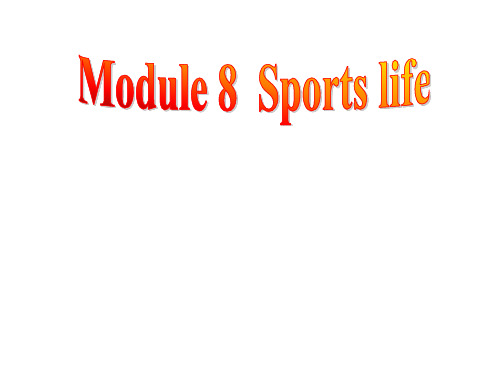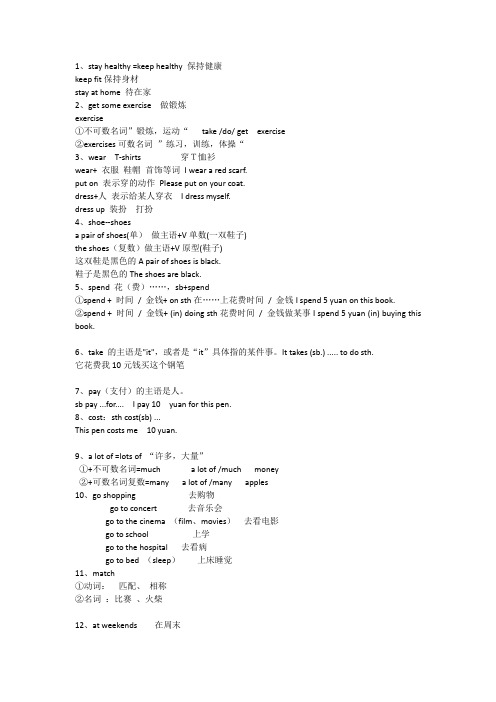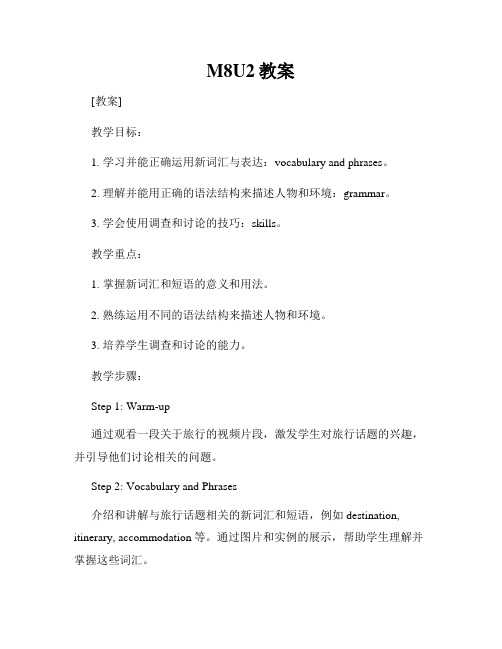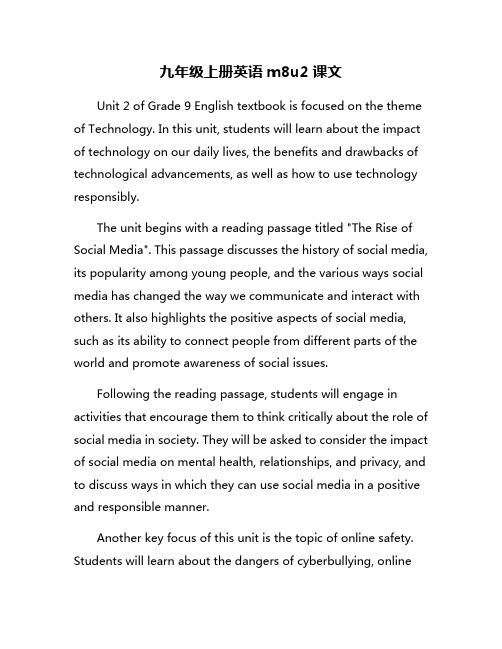M8U2
外研版七年级下册英语m8u2课文

外研版七年级下册英语m8u2课文全文共3篇示例,供读者参考篇1Unit 2 Our School LifeIn this unit, we will talk about school life. School is a place where students spend a lot of time learning, playing, and growing, so it is important for us to make the most of our school days. Let's take a closer look at the activities and experiences that make up our school life.First of all, let's talk about classes. In school, we have a variety of subjects to study, such as English, Math, Science, and History. Each subject is important in its own way, and it is essential for us to pay attention and work hard in every class. Teachers play a crucial role in our learning process, guiding us through the material and helping us understand difficult concepts. It is important for us to respect our teachers and appreciate the knowledge they share with us.Apart from classes, school also involves extracurricular activities. These are activities that take place outside of regular class time, such as sports, music, drama, and clubs. Participatingin extracurricular activities can help us develop new skills, make friends, and have fun. It is important for us to take advantage of these opportunities and try new things that we are interested in.School life is not just about academics and extracurricular activities, but also about social interactions. We spend a lot of time with our classmates, and it is important for us to treat each other with kindness and respect. Building good relationships with our peers can make our school experience more enjoyable and rewarding.In conclusion, school life is a valuable and important time in our lives. By making the most of our classes, participating in extracurricular activities, and building positive relationships with our peers, we can create a fulfilling and memorable school experience. Let's cherish these school days and strive to be the best versions of ourselves.篇2Unit 2 DiversityLesson 1:Key vocabulary:1. Diversity – the state of being diverse or different2. Ethnicity – the fact of belonging to a particular ethnic group3. Stereotype – a widely held but fixed and oversimplified image or idea of a particular type of person or thing4. Assumption – a thing that is accepted as true without proof5. Discrimination – the unjust treatment of different categories of people, especially on the grounds of race, age, or sexIn this lesson, students will learn about the concept of diversity and explore how it manifests in their own lives. They will be introduced to the idea that diversity is a natural part of society and should be celebrated rather than shunned.Materials needed:1. Textbook2. Worksheets on diversity3. Pen and paper4. Internet access for researchLesson objectives:1. To define the concept of diversity2. To explore the different aspects of diversity, such as ethnicity, culture, and religion3. To discuss how stereotypes and assumptions can be harmful4. To reflect on personal experiences of diversity and discrimination5. To brainstorm ways to promote inclusion and acceptance in their communitiesActivities:1. Introduce the lesson by asking students what diversity means to them and how they have experienced diversity in their own lives.2. Show a video clip or share a story that illustrates the importance of diversity.3. Break students into small groups to discuss the different types of diversity they see in their communities.4. Have students present their findings to the class and engage in a group discussion about the benefits of diversity.5. Ask students to reflect on a time when they or someone they know experienced discrimination based on their difference.6. Brainstorm ways to combat discrimination and promote inclusion in their school and community.Assessment:Students will be assessed based on their participation in class discussions, their completion of worksheets, and their reflections on personal experiences of diversity and discrimination.Lesson 2:Key vocabulary:1. Tolerance – the ability or willingness to tolerate something, in particular the existence of opinions or behavior that one does not necessarily agree with2. Acceptance – the action of consenting to receive or undertake something offered3. Empathy – the ability to understand and share the feelings of another4. Prejudice – preconceived opinion that is not based on reason or actual experience5. Inclusive – including or covering all the services, facilities, or items normally expected or requiredIn this lesson, students will learn about the importance of tolerance and acceptance in fostering a diverse and inclusive society. They will explore the role of empathy in understanding others' perspectives and discuss how prejudice can hinder social cohesion.Materials needed:1. Textbook2. Worksheets on tolerance and acceptance3. Pen and paper4. Internet access for researchLesson objectives:1. To define the concepts of tolerance, acceptance, empathy, prejudice, and inclusivity2. To examine the impact of intolerance and prejudice on individuals and communities3. To explore strategies for promoting tolerance and acceptance in daily interactions4. To practice empathetic listening and communication skills5. To brainstorm ways to create a more inclusive school environmentActivities:1. Show a video clip or share a story that highlights the importance of tolerance and acceptance in diverse societies.2. Ask students to define key terms such as tolerance, acceptance, and empathy.3. Break students into pairs to role-play a scenario where tolerance and acceptance are essential.4. Have students share their scenarios with the class and discuss how empathy can help bridge differences.5. Engage students in a group discussion about the prevalence of prejudice in society and brainstorm ways to combat it.6. Ask students to reflect on a time when they exhibited tolerance or acceptance towards someone different from themselves.Assessment:Students will be assessed based on their participation in class activities, their ability to define key terms accurately, and their reflections on personal experiences of tolerance and acceptance.篇3Unit 2 of the New Standard English Grade 7 textbook introduces the topic of "Sports and Hobbies". In this unit, students learn vocabulary related to various sports and hobbies, practice using the present continuous tense to talk about current activities, and discuss their own interests and preferences.The unit begins with a reading passage about a boy named Jack who enjoys playing basketball. The passage describes how Jack practices every day after school and his excitement for an upcoming tournament. Students are encouraged to engage with the text by answering questions and discussing Jack's habits and motivations for playing basketball.Following the reading passage, students learn new vocabulary related to sports and hobbies, such as "skiing", "cycling", "swimming", and "playing the guitar". They practice using these words in sentences and short conversations to reinforce their understanding.Next, students are introduced to the present continuous tense and learn how to use it to talk about actions happening at the moment of speaking. They practice forming sentences in the present continuous tense with verbs related to sports and hobbies, such as "I am playing tennis" or "She is practicing the piano".In the speaking section of the unit, students have the opportunity to discuss their own sports and hobbies with a partner. They can ask each other questions such as "What sports do you enjoy playing?" or "Do you have any hobbies that you do regularly?" This helps students practice using the vocabulary and grammar structures they have learned in a more interactive way.Finally, students complete a writing task where they can write about their favorite sport or hobby, using the vocabulary and grammar structures from the unit. This task encourages students to express their own interests and preferences in English and helps them practice writing in a coherent and organized way.Overall, Unit 2 of the New Standard English Grade 7 textbook provides students with the opportunity to learn and practice vocabulary related to sports and hobbies, as well as the present continuous tense. Through reading, speaking, andwriting activities, students can engage with the material in a meaningful way and improve their English language skills.。
四年级英语下学期M8Unit2 It's in the north of China教案 外研版一起

小学英语课时备课设计学生活动:学生跟读潍坊市著名景点。
(学习知识点:潍坊市著名景点。
)2.学习内容:教师请学生进行对话示范,Where's Yangjiabu?B: It's in the east of Weifang.学生活动:观察潍坊景点地图中的景点位置,展开对子合作A: Hello, ...B: Hello,...A: Look, this is a map of Weifang. Where's ...?B: It's...(学习知识点:句型Where's ...? It's...)3.学习内容:教师列举学生刚刚说过的景点,询问学生有没有什么话想对自己的家乡潍坊说?学生活动:学生回答潍坊是一个美丽的城1.学习内容:教师呈现小短文,让学生尝试短文填空。
学生活动:根据对课文的理解进行短文填空。
图2.学习内容:播放课文音频,巡回观察指导,了解学生的跟读情况,并纠正发音。
学生活动:Listen and repeat.跟读并注意语音语调,模仿语音语调。
3.学习内容:教师呈现课本上的地图,教师带领学生展开复述Beijing is in the north of China. Suzhou is in the east of China. Lhasa is in the west of China. Guangzhou is in the south of China.学生活动:根据图中的四个地点,复述课文。
学习内容:教师设置情境:研学旅行中读图识图能力是必不可少的。
你能读懂你所心仪城市的地图吗?让我们来试一试吧!教师呈现地图:教师邀请一名同学上台示范Where’s the library?It’s in the south of the city.学生活动:观察地图,同桌之间展开对子合作:Where’s…?It’s in the …(学习知识点:句型Where’s…?It’s in the …及读图识图能力)Module 8 Unit 2 It’s in the north of China.beastWhere’s the libray?It’s in the south of the city.。
九年级英语上册(外研版 课件):M8U2

back
请同学们在 课后参照《 巴蜀英才•英 语》P66的内 容进行复习
。
4.pride n.自豪感;骄傲
pride 【相关短语】the pride of “……的骄傲”;take pride in “以……为骄傲;以……而自豪” (其同义短语是be proud of, 其中的proud是pride的形容词 形式,意为“骄傲的,自豪 的”)
new words
sportsperson n. 运动员 Asian adj. 亚洲的;亚洲人的 suffer v. 患有(疾病等);经受
suffer from 受(某种病痛)折磨; 因……而受苦
first place 第一名;冠军
new words stop sb. (from) 阻止某人做某事
Do you have his poster?
Would you like to be a famous man like him?
Review
Read the words and expressions loudly.
new words
sportsman n. (尤指职业的) 运动员 high jump 跳高
The old mother takes great pride in her children’s success. =The old mother is very proud of her children’s success.
这位年老的母亲为自己的孩子 取得的成功感到无比骄傲。
back
1. look at the picture and the title of the passage in Activity 2. Say what you know about Liu Xiang and how he became a sports hero.
外研版七年级英语上M8u2语法归纳

1、stay healthy =keep healthy 保持健康keep fit保持身材stay at home 待在家2、get some exercise做锻炼exercise①不可数名词”锻炼,运动“take /do/ get exercise②exercises可数名词”练习,训练,体操“3、wear T-shirts 穿T恤衫wear+ 衣服鞋帽首饰等词I wear a red scarf.put on 表示穿的动作Please put on your coat.dress+人表示给某人穿衣I dress myself.dress up 装扮打扮4、shoe--shoesa pair of shoes(单)做主语+V单数(一双鞋子)the shoes(复数)做主语+V原型(鞋子)这双鞋是黑色的A pair of shoes is black.鞋子是黑色的The shoes are black.5、spend 花(费)……,sb+spend①spend + 时间/ 金钱+ on sth在……上花费时间/ 金钱I spend 5 yuan on this book.②spend + 时间/ 金钱+ (in) doing sth花费时间/ 金钱做某事I spend 5 yuan (in) buying this book.6、take 的主语是"it",或者是“it”具体指的某件事。
It takes (sb.) ..... to do sth.它花费我10元钱买这个钢笔7、pay(支付)的主语是人。
sb pay ...for.... I pay 10 yuan for this pen.8、cost:sth cost(sb) ...This pen costs me 10 yuan.9、a lot of =lots of “许多,大量”①+不可数名词=much a lot of /much money②+可数名词复数=many a lot of /many apples10、go shopping 去购物go to concert去音乐会go to the cinema (film、movies)去看电影go to school 上学go to the hospital 去看病go to bed (sleep)上床睡觉11、match①动词:匹配、相称②名词:比赛、火柴12、at weekends在周末13 on 通过.....的方式on the radio 通过收音机on the Internet 通过因特网14、choose sth. for sb.为某人挑选某物choose to do sth 选择做某事。
M8U2教案

M8U2教案[教案]教学目标:1. 学习并能正确运用新词汇与表达:vocabulary and phrases。
2. 理解并能用正确的语法结构来描述人物和环境:grammar。
3. 学会使用调查和讨论的技巧:skills。
教学重点:1. 掌握新词汇和短语的意义和用法。
2. 熟练运用不同的语法结构来描述人物和环境。
3. 培养学生调查和讨论的能力。
教学步骤:Step 1: Warm-up通过观看一段关于旅行的视频片段,激发学生对旅行话题的兴趣,并引导他们讨论相关的问题。
Step 2: Vocabulary and Phrases介绍和讲解与旅行话题相关的新词汇和短语,例如destination, itinerary, accommodation等。
通过图片和实例的展示,帮助学生理解并掌握这些词汇。
Step 3: Grammar引导学生学习和理解描述人物和环境的语法结构,例如present simple和present continuous tense的使用。
通过展示不同的句子和对话,帮助学生熟悉这些语法结构,并进行实际操练。
Step 4: Listening and Speaking让学生听取一段关于旅行经历的录音,并回答相关问题。
然后,组织学生进行小组讨论,分享自己的旅行经历并提出问题。
鼓励学生使用刚学到的新词汇和语法结构来描述。
Step 5: Reading and Writing学生阅读一篇有关旅行的短文,并回答相关问题。
然后,让学生用所学的词汇和语法结构自己写一篇关于自己最喜欢的旅行地点的短文,包括地点的描述、旅行行程和个人观感。
Step 6: Review and Practice通过游戏等形式复习本节课所学的内容,并进行综合练习。
鼓励学生用新学的词汇和语法结构进行问答和讨论,加强对所学知识的巩固和运用。
Step 7: Assessment通过布置作业或小测验,对学生的学习成果进行评估,并提供反馈。
九年级下册m8u2知识点

九年级下册m8u2知识点九年级下册 M8U2 知识点第一部分:生词学习本单元的生词主要涉及以下几个方面:1. 文学作品:如novel(小说)、story(故事)、poem(诗歌)等。
例句:He enjoys reading novels in his free time.2. 文学流派:如science fiction(科幻小说)、fantasy(奇幻小说)、adventure(冒险故事)等。
例句:I'm a big fan of science fiction books.3. 文学人物角色:如protagonist(主角)、antagonist(反派角色)、narrator(叙述者)等。
例句:The protagonist in the story overcame many challenges.4. 表达情感和主题的词汇:如emotions(情感)、themes(主题)、moral(道德)等。
例句:The story explores different themes, such as love and friendship.第二部分:重点语法本单元的语法重点是宾语从句。
1. 宾语从句是由连接词(即连词)引导的从句,作为主句的宾语。
例句:She asked me if I had finished my homework.2. 连接词常用的有:that, if, whether等。
例句:I wonder if it will rain tomorrow.3. 当宾语从句是陈述句时,连接词可以省略。
例句:He told us (that) he would be late for the meeting.4. 宾语从句可以出现在及物动词、形容词和名词的后面。
例句:I believe that she is a talented singer.第三部分:阅读理解技巧本单元的阅读理解主要包括略读和扫读两种技巧。
三年级下册英语m8u2作文

三年级下册英语m8u2作文全文共3篇示例,供读者参考篇1Unit 2 My School DayMy School DayMy school day begins early in the morning. I wake up at 6:30 and start getting ready for school. I brush my teeth, wash my face, and get dressed in my school uniform. I have breakfast with my family, usually toast and milk.I leave for school at 7:30. My school is not too far from my house, so I walk there with my friends. We chat and laugh along the way, and before we know it, we have reached the school gates.School starts at 8:00. Our first class is English, and we learn new words and practice our pronunciation. Next, we have math class where we solve equations and work on our times tables. I find math interesting and like to challenge myself with new problems.After two more classes, it's time for lunch. I sit with my friends in the cafeteria and we share stories from our morning classes. I usually bring a packed lunch from home, which is usually a sandwich, fruit, and a juice box.In the afternoon, we have science and art classes. In science, we conduct experiments and learn about the world around us. In art, we get to be creative and make our own masterpieces. I love to paint and draw, so art class is always a highlight for me.School ends at 3:00, and I walk back home with my friends. We talk about our plans for the evening and make promises to meet up later. Once I reach home, I do my homework and study for any upcoming tests. I also play with my dog and help my mom with dinner.My school day is always busy and filled with learning, but I enjoy every moment of it. I have great teachers and friends who make each day fun and exciting. I can't wait to see what tomorrow's school day will bring.篇2Title: A Trip to the ZooLast weekend, my class went on a field trip to the zoo. It was a very exciting and fun experience for all of us. We were alllooking forward to seeing all the amazing animals and learning more about them.When we arrived at the zoo, we were greeted by a guide who would be showing us around. She told us about the different animals we would see and gave us some interesting facts about them. We were all very eager to start exploring.Our first stop was the lion enclosure. We were amazed by how big and powerful the lions were. We watched them as they roamed around their enclosure, and even got to see them feed. It was incredible to see such magnificent animals up close.Next, we visited the monkey exhibit. The monkeys were swinging from trees and playing with each other. It was so cute to watch them interact and have fun. We were even lucky enough to see a baby monkey clinging to its mother. It was a heartwarming sight.After that, we went to see the giraffes. They were towering over us with their long necks and beautiful patterns. We learned that giraffes are the tallest land animals in the world. It was quite a sight to see them in person.We also saw elephants, zebras, tigers, and many other animals throughout the day. Each one was unique andfascinating in its own way. We learned so much about different species and how important it is to protect and conserve wildlife.At the end of the day, we all gathered together to share our favorite parts of the trip. It was unanimous that the zoo was an amazing place and we all had a fantastic time. We were grateful for the opportunity to learn about animals and nature in such a hands-on way.Overall, our trip to the zoo was a memorable experience that we will never forget. We can't wait to go back and learn even more about the incredible creatures that inhabit our planet.篇3Unit 2 of Grade 3 English textbook is about professions. In this unit, students learn about different jobs and the responsibilities that come with them. They also learn about how to introduce themselves and talk about their dreams for the future.One of the activities in this unit is writing a composition about what job they want to have when they grow up. Below is an example of a composition that a Grade 3 student might write:When I grow up, I want to be a teacher. I think being a teacher is a wonderful and important job because teachers help students learn new things and grow as individuals.As a teacher, I will have many responsibilities. I will need to prepare lessons that are interesting and engaging for my students. I will also need to create a safe and supportive classroom environment where all students feel valued and respected. I will need to be patient and understanding, and always be willing to help my students when they need it.I also want to be a teacher because I love working with children. I think it is so rewarding to see a student understand a new concept or master a new skill. I want to be a positive role model for my students and inspire them to reach their full potential.In order to achieve my dream of becoming a teacher, I will need to study hard and work towards my goal. I will need to get good grades in school and continue my education after high school. I will also need to gain experience working with children and develop my teaching skills.I am excited about the possibility of becoming a teacher and helping students learn and grow. I know that it will be a challenging job, but I believe that it will also be incrediblyrewarding. I can’t wait to start my journe y towards becoming a teacher.This composition is a simple example of what a Grade 3 student might write about their future job aspirations. It incorporates the vocabulary and grammar structures that they have learned in Unit 2 of their English textbook, and demonstrates their understanding of the topic of professions. Through activities like this, students can practice their English writing skills and express their thoughts and ideas in a creative way.。
九年级上册英语m8u2课文

九年级上册英语m8u2课文Unit 2 of Grade 9 English textbook is focused on the theme of Technology. In this unit, students will learn about the impact of technology on our daily lives, the benefits and drawbacks of technological advancements, as well as how to use technology responsibly.The unit begins with a reading passage titled "The Rise of Social Media". This passage discusses the history of social media, its popularity among young people, and the various ways social media has changed the way we communicate and interact with others. It also highlights the positive aspects of social media, such as its ability to connect people from different parts of the world and promote awareness of social issues.Following the reading passage, students will engage in activities that encourage them to think critically about the role of social media in society. They will be asked to consider the impact of social media on mental health, relationships, and privacy, and to discuss ways in which they can use social media in a positive and responsible manner.Another key focus of this unit is the topic of online safety. Students will learn about the dangers of cyberbullying, onlinepredators, and identity theft, and will be given tips on how to protect themselves while using the internet. They will also be introduced to common online scams and how to identify and avoid them.Overall, Unit 2 of Grade 9 English textbook provides students with valuable insights into the world of technology and social media. By the end of the unit, students will have a better understanding of how to navigate the digital landscape in a safe and responsible way.。
